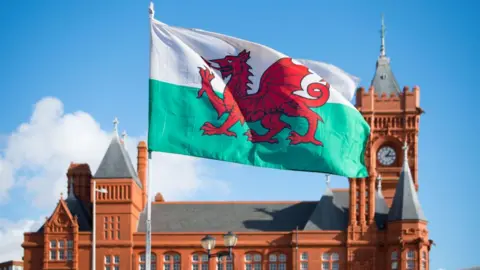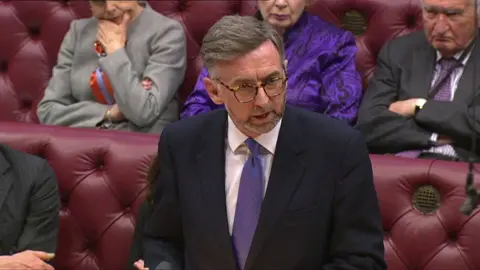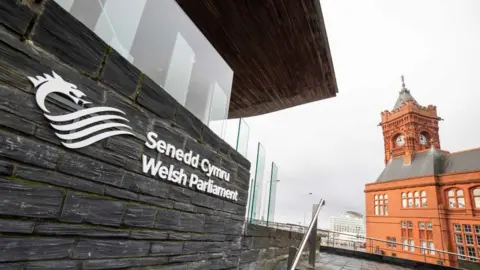Welsh independence: How worried should UK ministers be?
 Getty Images
Getty ImagesIn the past few years, debate has raged about whether the United Kingdom faces a future without Scotland.
Polls have suggested for months that support for Scottish independence has been higher than for Scotland staying in the UK.
In Wales, independence is still a minority view, but a campaign aimed at making it a reality has gained momentum in the past year.
Now, a former adviser to David Cameron on devolution says there is "no room for complacency" about support for the union in Wales.
Lord Dunlop was also commissioned by Theresa May in July 2019 to produce a government review into strengthening the union.
Completed more than a year ago, it remains unpublished.
Now, as some Labour peers describe the union as "under threat as never before", cross-party pressure is mounting on the government to release it.
But how "under threat" is the union in Wales?
January's Welsh Political Barometer poll for ITV Wales and Cardiff University suggested 22% would vote yes if a referendum was held.
Most, 53%, told the poll they would say no, while a quarter of respondents said they did not know.
Meanwhile, the pro-independence campaign Yes Cymru says its membership has jumped from 2,000 at the start of 2020 to more than 17,000.
Elsewhere, rows have broken out between UK and Welsh ministers over who should control funds replacing EU aid and a new trade law that the UK government says will protect Welsh businesses, but critics say will centralise power in London.
Welsh ministers have said Westminster-Cardiff relations have worsened since Boris Johnson took over from Theresa May - though the UK government says there has been regular engagement on issues such as coronavirus and Brexit.
Lord Dunlop says reforming intergovernmental relations is one of the key recommendations in his unpublished report.
"It needs to be less ad hoc, more predictable, a flow of meetings, I think the agendas need to be more about joint decision-making. It needs to feel jointly owned."
He said people in Wales should not get "carried away by individual polls" but there was not "any room for complacency".
"There's been some suggestion devolution has failed because it hasn't killed nationalism. Whereas my view is devolution isn't a failed project - it's an unfinished project."
He believes making discussions between governments more "transparent" would encourage a "constructive atmosphere to intergovernmental relations rather than the grievance-fest that it has been in the past."
Privately, there are some Conservative MPs pondering if the Dunlop review is now out of date or a bit too "tame" to save the union.
Other, more devolution-sceptic voices in the party resent talk of more devolution or even phrases like "four-nations approach".
 House of Lords
House of LordsMrs May's de-facto deputy Sir David Lidington warned her cabinet in the past not to be complacent about Wales.
Now outside government, he said while it was "nice to be flattered", if Welsh ministers felt relations were better under Mrs May, the UK government should "give some thought as to what lies behind that".
"It's not rocket science," he said.
"It's allowing enough time for consultation, being open with people, sharing as much information as you can, inviting devolved officials and ministers to some of the cross-departmental committees and Cobra meetings that are sorting out UK-wide policy but have a devolved impact," he said.
He said that should be "supported by confidential, private conversations between ministers".
Political analyst Laura McAllister says Welsh independence is a topic on all parties' radars.
"We know at the moment independence in Wales remains a minority interest," she said.
"But, and I think this is an important consideration, there is real momentum behind the Yes Cymru campaign and a real sense of growth and energy around it which of course contrasts with those who want to keep the union in place at all costs - because there isn't an energy around that and there isn't a kind of strategic plan either."

Behind the scenes in Downing Street, a Welsh special adviser has been working in No 10's union unit over the past few months.
It is understood the UK government will soon be hosting regular "lobby briefings" for journalists with the Welsh Secretary Simon Hart.
Downing Street sources say while their approach is more defensive when it comes to Scotland, the prime minister is excited by opportunities in Wales.
One senior UK government source said: "There's definitely an increased recognition within No 10 that Wales is a strong unionist nation, and that there is an opportunity to build upon the 2019 general election result by levelling up the Welsh communities that have felt left behind by both the Welsh Government and previous UK governments."
Mr Hart has previously said Welsh ministers want to use new spending powers granted through the UK Internal Market Act to invest in Wales.
In response to recent calls for the Dunlop report to be published, Cabinet Office Minister Michael Gove said it would be published "in due course" but it would be alongside a joint review of intergovernmental relations reforms with the devolved administrations.
 Getty Images
Getty ImagesMeanwhile, Labour have set up a constitutional commission advised by former Prime Minister Gordon Brown to look at devolution across the UK.
Labour's Shadow Welsh Secretary Nia Griffith said: "Unfortunately some comments the prime minister has made has made Wales feels as if it's an afterthought.
"Of course people are saying: 'Would we be better just with our own Welsh Government?' But obviously what we all have to remember is there are so many things we can also do together.
"I think the really important thing is listening to what people are saying. What is it that is making people want independence and what do they mean by independence?
"Do they actually mean the sort of independent decision making that we currently have in Welsh Government?
"Or do they mean completely trying to cut off and have no rapport whatsoever - that's what the first discussion has to be."
Plaid Cymru, the Green Party, Gwlad Gwlad and Propel - if it is registered in time - are standing on an independence platform in May's Welsh parliament elections.
Meanwhile, the Abolish the Assembly Party want Welsh devolution abolished completely.
Plaid Cymru's Westminster leader Liz Saville Roberts said there was a "growing realisation the length and breadth of Wales that unless we act, we will be left behind as an appendage to England in a rump UK".
She said that "for the first time ever, independence will be a key issue going into a Senedd election".

- GET EXCITED FOR SIX NATIONS 2021: Eddie Butler celebrates the return of this years tournament, alongside some famous faces
- THE WELSH COMEDY COLLECTION: Classic shows and new favourites bringing guaranteed laughs

